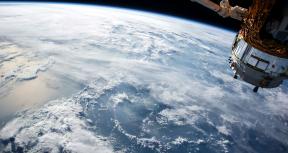This blog is part of the series Learning from Fragility that aims to inform discussions at the upcoming Fragility Forum by exploring lessons from past support for development in fragile and conflict settings.
Natural resources, climate change and conflict are deeply linked. In the last 60 years, at least 40% of all intrastate conflicts were linked to natural resources, which doubles the risk of a conflict relapse within five years. On top of this, climate change multiplies the threats, worsening resource scarcity and existing vulnerabilities.
The interplay of natural resources, fragility, and climate change is evident in the communities around the Lake Chad Basin. The lake’s rich waters have long been an important economic resource, sustaining over 20 million people that inhabit its basin. Since 1960, the lake has shrunk by about 90%, disrupting millions of livelihoods as pastoralists are forced to switch from water-intensive cattle to less resource-intensive goat herding, and fishers make the switch from aquaculture to agriculture. Coping with resource stresses has led many to rely on unsustainable farming and irrigation practices.
The increasing scarcity of natural resources in the Lake Chad Basin and elsewhere are not only felt in the pockets of those living nearby. In less than 30 years, 25% of the planet will experience serious drought and desertification. Every year, dry seasons in affected regions get longer and longer, with the lack of water directly impacting agriculture. By 2050, around 200 million people could be displaced as a result of desertification, sea-level rise, and increased extreme weather events.
As climate change and population pressures increase, resource scarcity and conflict risks mount. In the past, disputes over fertile land and freshwater fueled the war in Darfur. Rising conflict between herders and farmers in Nigeria has become six times deadlier than Boko Haram’s insurgency. This is now Nigeria’s gravest security challenge. Having displaced hundreds of thousands of people already, the conflict, at its core about land use, sharpens ethnic, regional and religious polarization as it creates new grievances.
With these compounding factors upending countless lives, the UN Security Council has recognized the possible security implications of climate change. Natural resource disputes are becoming increasingly frequent with population and income growth, the introduction of new extraction techniques, and countries’ greater vulnerability to natural disasters. These disputes impact the economic performance of countries and lead to weaker, more corrupt, and less accountable governments and thus poorer socio-economic outcomes. This ultimately creates a vicious cycle of resource dependence and low human development as other economic sectors are disrupted by conflict. These compound risks also pose direct threats to development interventions which need to become more sensitive to the causes and consequences of conflict. A recent evaluation of how the World Bank engages in conflict situations found such conflict sensitivity to still be lacking in many projects in the Sahel.
The flip side of the natural resource-climate-conflict nexus is that resources can also build resilience and reduce fragility and conflict. Called many names, including climate security and environmental peacebuilding, various actors can engage with these issues from governance, resource management, or security angles.
Resource-rich countries can build inclusive, transparent, and accountable Natural Resource Management (NRM) systems. Effectively managing natural resources and climate change through domestic and regional policy measures such as monitoring of conflict commodities, better managing trade, and transparency can strengthen resilience and development. This allows for the sustainable and equitable use of natural resource assets, building resilience for communities and protecting against environmental degradation. Through this path, the environment, natural resources, and climate change serve as key components of peacebuilding. However, as IEG’s evaluation of World Bank support to sustainable natural resource management shows, this is not without difficulty – NRM projects often struggle to find the right balance between achieving resource recovery and meeting the welfare needs of vulnerable resource users.
A 2022 Fragility Forum webinar, “Defueling Conflict: Natural Resource Governance as a Pathway to Peace,” organized by the World Bank, will explore these topics from diverse perspectives. Practitioners of various disciplines will discuss the challenges in resource governance, common pitfalls, suitability of traditional conflict reduction mechanisms to address resource conflict, and available resources and tools. Join the conversation on March 10th, 2022, 10-11 AM Washington, D.C. / 3-4 PM Abidjan / 4-5 PM Brussels / 6-7 PM Nairobi.
Register for free to the Fragility Forum here and sign up for the webinar “Defueling Conflict.”
Photo: a forest guard in Tahoua, Niger. Credit: Rafe H Andrews, Dawning.









Add new comment